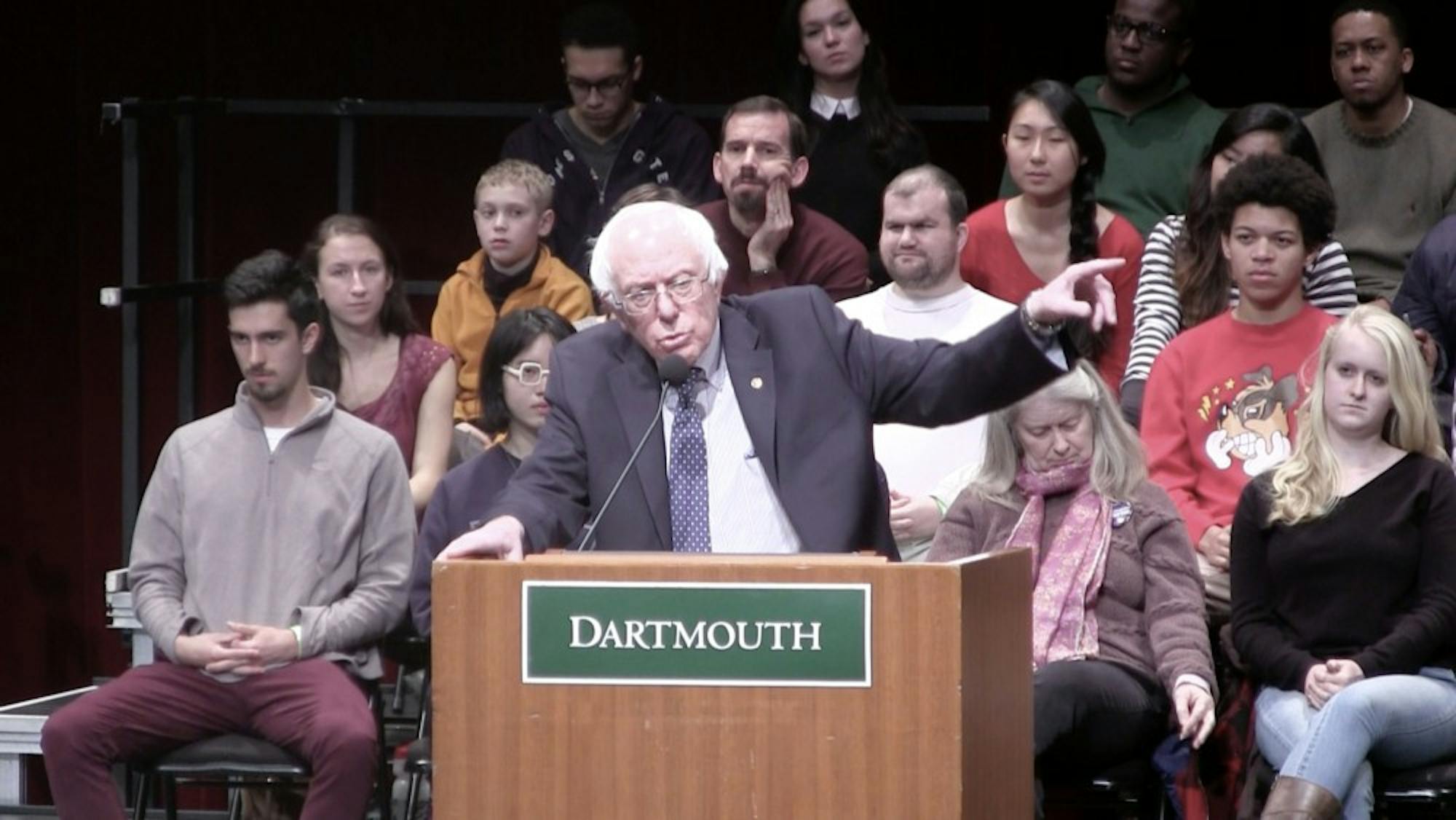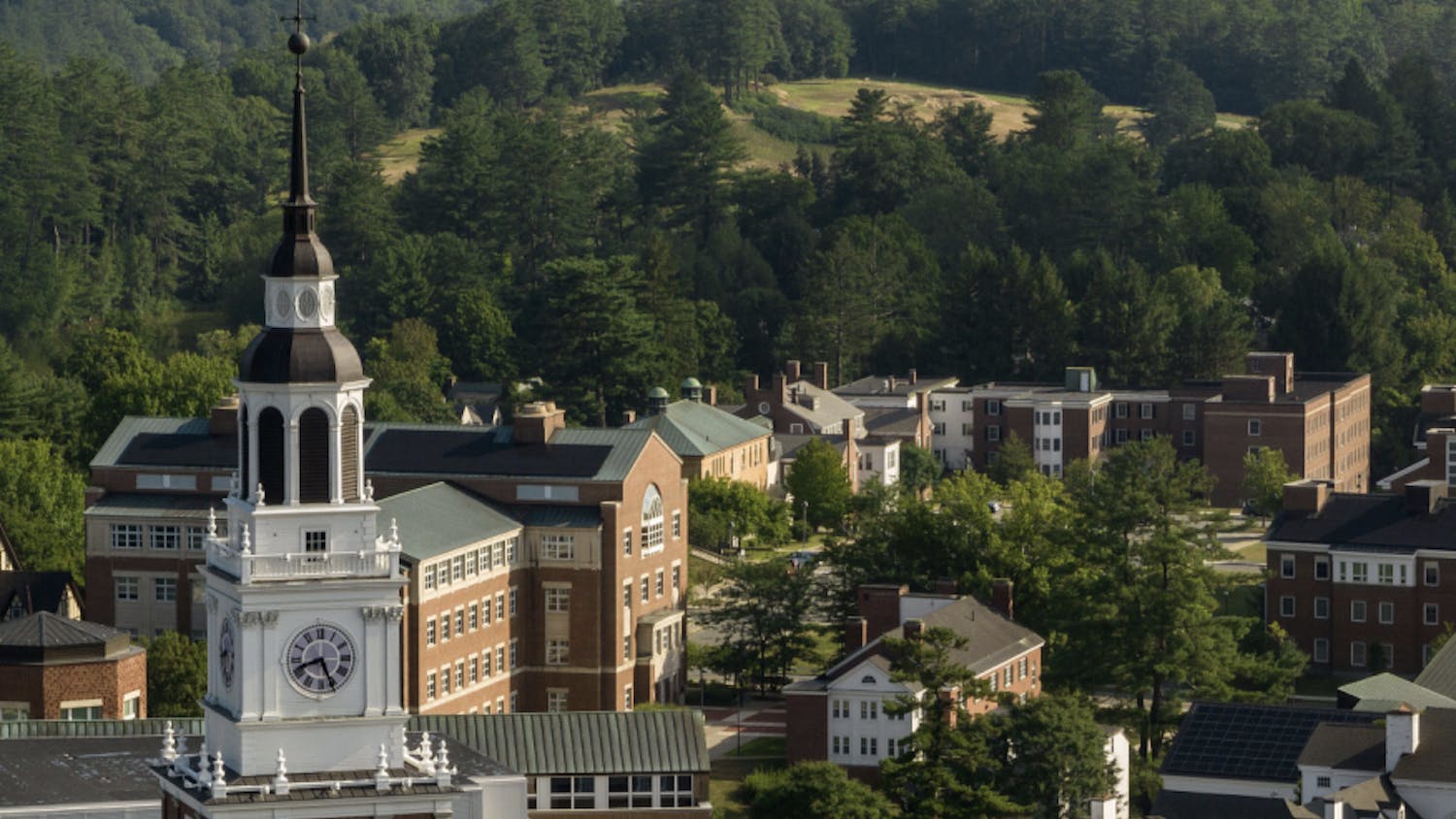Democratic presidential candidate Bernie Sanders addressed a full Spaulding Auditorium last night in a speech organized by the Rockefeller Center for Public Policy and the Social Sciences and the Tuck School of Business.
Sanders pitched much of his speech in support of the economically disadvantaged and against what he characterized as a powerful elite responsible for increasing wealth inequality.
“Wall Street, corporate America, the large campaign donors, the corporate media are so powerful that the only way we transform this country is when millions of people demand that we have a government that represents all of us,” he said.
Sanders proposed progressive policies aimed at helping economically disadvantaged citizens such as three months of paid family leave, a living wage of $15 an hour, a large-scale federal jobs program intended to create 13 million jobs and a single-payer model of healthcare, all funded by higher taxes on the wealthy and financial institutions.
https://www.youtube.com/watch?v=W7wPULxl30g
Sanders also talked about criminal justice reform at length, proposing the decriminalization of marijuana, the reform of police forces and the reduction of prison populations. However, Sanders did not explicitly vilify police officers.
“The vast majority of police officers are honest and work very hard in what is a very difficult job,” he said.
Sanders repeated his criticism of Wall Street for what he described as their responsibility for the financial crisis. The Vermont senator advocated the break-up of the largest banks and the return of the Glass-Steagall Act that separated retail and investment banking.
Additionally, Sanders attacked American billionaires by name such as the Koch brothers, the owners of Koch Industries, and the Walton family, the owners of Wal-Mart.
“I say to the Walton family, get off the welfare train, start paying a decent wage,” he said.
Sanders also criticised Republican presidential candidates for their intolerance.
“We do not allow Donald Trump and the others to divide us up based on our nations of origin, or sexual orientations or our religion,” he said.
Sanders was particularly critical of current campaign finance laws.
“When you have one family and a few of their friends spending more than both political parties, that is not democracy, that is oligarchy,” he said.
Sanders highlighted his own campaign’s successful fundrasising through small donations. Over the last eight months, he said, his campaign has received 2.5 million individual contributions from over 1 million people, with an average contribution of $27.
The line to get into the event stretched outside the doors of the Hopkins Center almost two hours before the doors opened. Most of those in line interviewed by The Dartmouth expressed approval of the senator.
The first person in line, Isaac Takushi ’16, an undecided voter leaning towards Sanders, said he arrived at 1:45 p.m. — over five hours before the event was scheduled to start.
“He has really strong positions that resonate with students especially,” Takushi said. “A lot of his main agenda points really resonate with me, like education, the environment and equality between the social classes.”
Rachel Brian, a researcher at a psychiatric research center, who was third in line, also said she had a favorable view of Sanders.
“He’s the first real politician who has come out and talked about the power elite,” she said.
The crowd included committed supporters who came from other towns to see Sanders, such as Carl Brandon, a teacher from Randolph Center, Vt. and a Sanders campaign donor who has been involved in Vermont Democratic politics for 40 years, he said.
“We have people who have enormous amounts of power and tend not to think very much about other people, and Bernie’s the only politician who really talks about that,” he said,
Others were attending the event to try to get a more accurate picture of the presidential candidates.
“We just want to be involved and see what every candidate has to offer,” Lida Vandermeer ’19 said. “I know Bernie really speaks to young people”.
Walker Schneider ’19, a Hillary Clinton supporter, said while in line that he was eager to experience Sanders in person.
“You hear how people are loving him,” Schneider said. “You hear how he’s this controversial figure, how he’s almost this revolutionary figure. I’m dying to see that for myself.”
However, some waiting to attend criticized the senator.
“I think Sanders is a communist,” Max Frankel ’19, a Ted Cruz supporter said. “The line we are waiting in is a short taste of the bread line we will be waiting in when Sanders becomes president.”
The event was preceded by a press conference, attended by national media outlets, where former senator and former chairman of the Democratic National Committee Paul Kirk endorsed Sanders for the presidency.
Despite being announced the day before, the event was at capacity, Sanders pointed out in his speech.
A series of speakers preceded Sander’s speech. Jordyn Turner ’16 started alongside Madeline Cooper ’16, College Democrats president. They were followed by dean of the Tuck School of Business Paul Danos and senior public policy lecturer Charlie Wheelan ’88. Director of the Sanders New Hampshire campaign Julia Barnes spoke next and introduced Kirk. Kirk in turn introduced Sanders.
Students interviewed after the event expressed positive reactions to Sanders’ speech.
“Many of the problems that he’s bringing to light resonate with me because I’ve been directly affected by them.” Alicea Olascoaga ’19 said.
John Brady ’19 said he enjoyed the event, particularly the active and enthusiastic audience.
“We didn’t hear anything new but it was great to see him,” Alex Derenchuk ’19 said.
Sanders has a 72 percent likelihood of winning the primary election when considering only state polls, according to FiveThirtyEight. The statistical website’s aggregate metric, polls-plus — which includes state polls, endorsements and national polls — shows Clinton edging out Sanders 57-43 as of press time. The latest Monmouth University poll released on Tuesday, shows Sanders holding a 14 point lead over Clinton in New Hampshire.




